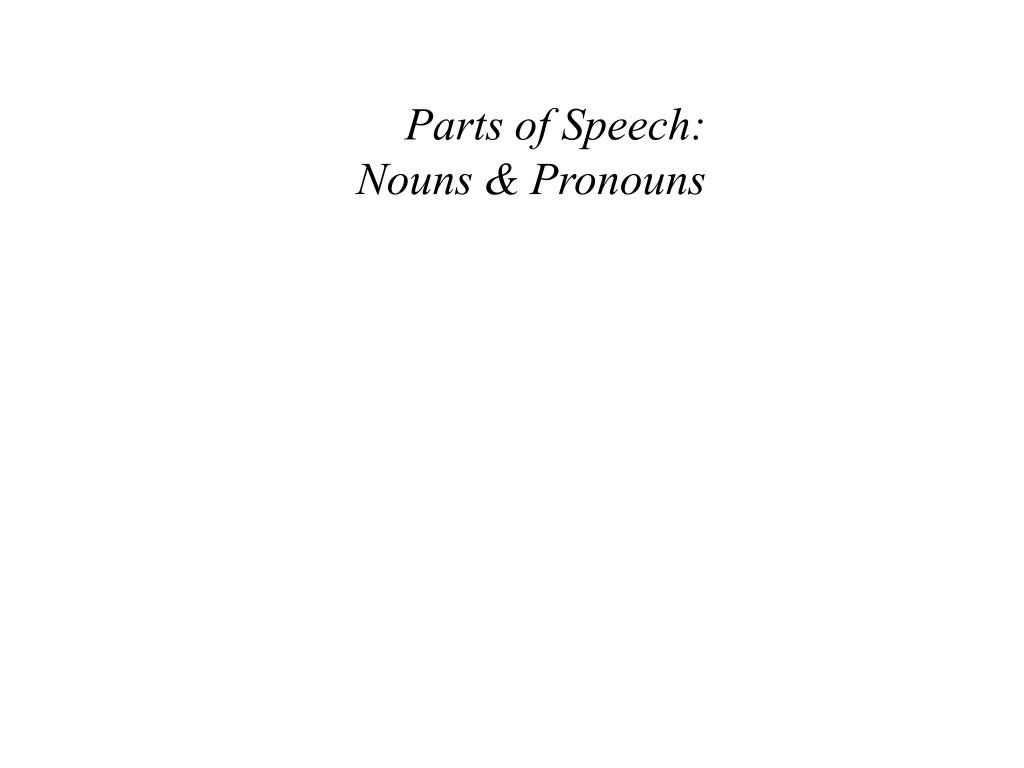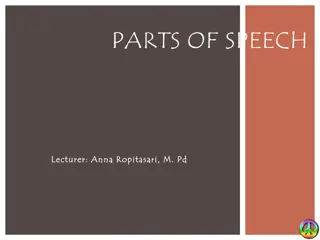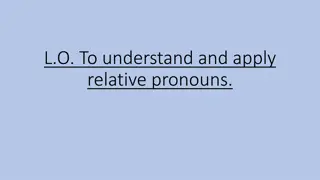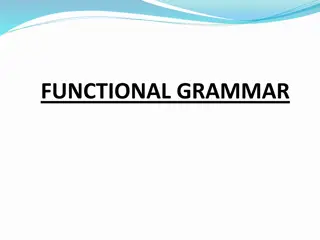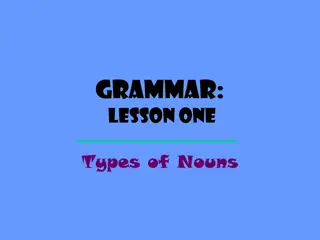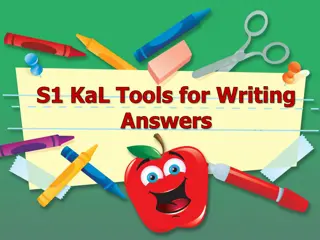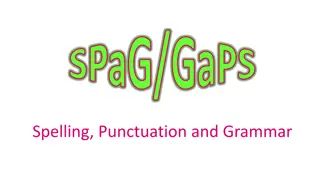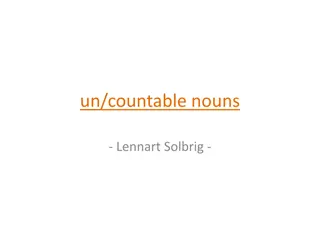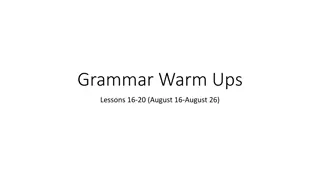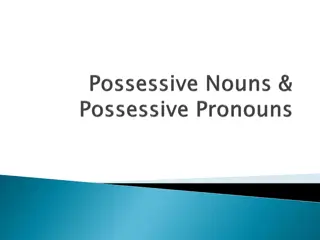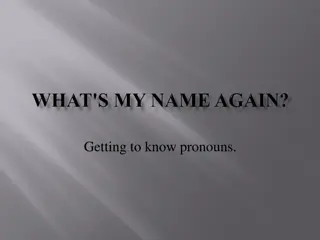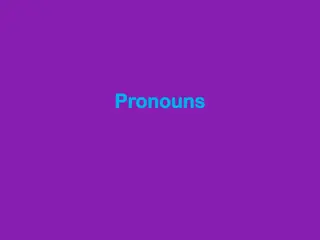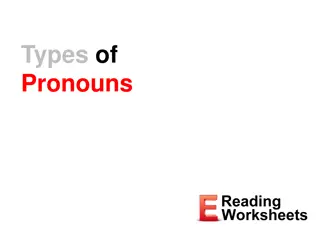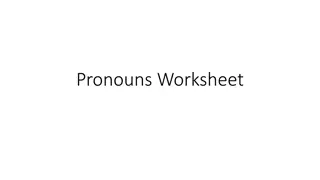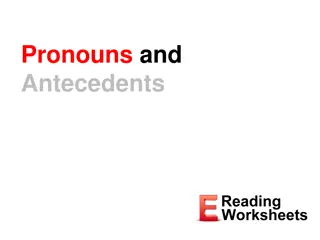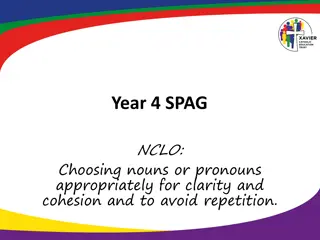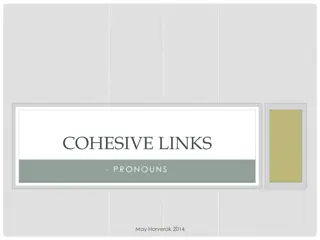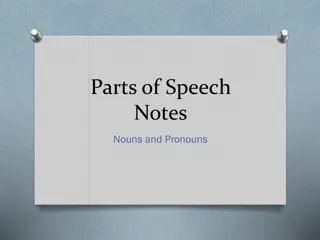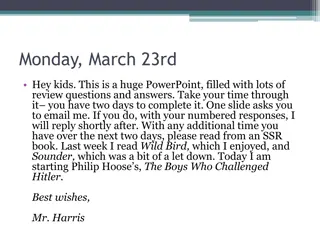Understanding Nouns and Pronouns in Grammar
Explore the concept of nouns and pronouns in grammar through examples and explanations. Learn about the different types of nouns, such as singular, plural, and collective nouns. Discover how compound nouns are formed and their usage in sentences.
Download Presentation

Please find below an Image/Link to download the presentation.
The content on the website is provided AS IS for your information and personal use only. It may not be sold, licensed, or shared on other websites without obtaining consent from the author. Download presentation by click this link. If you encounter any issues during the download, it is possible that the publisher has removed the file from their server.
E N D
Presentation Transcript
Parts of Speech: Nouns & Pronouns
Introduction Read the following sentences and see how the word fishing is being used. verb I am fishing on Sunday. adjective She has a fishing rod. noun Fishing is my favorite sport. In general, it is important to read the sentence and determine how the word is being used, even though some words are strictly thought of as verbs, nouns, adjectives, etc.
Nouns A noun (from Latin n men, literally name) is a word that functions as the name of a specific object or set of objects, such as living creatures, places, actions, qualities, states of existence, or ideas. However, noun is not a semantic category, so it cannot be characterized in terms of its meaning. Thus, actions and states of existence can also be expressed by verbs, qualities by adjectives, and places by adverbs. Linguistically, a noun is a member of a large, open part of speech whose members can occur as the main word in the subject of a clause, the object of a verb, or the object of a preposition. The cat chased the toy. Toby made macaroni for the picnic. The leaves on the plant are shriveling. The author discusses philosophy in her book on liberty.
Nouns Nouns can be singular or plural. Plural nouns usually end in s or es. Three wolves howled at the moon. The library has thousands of books. The professor explained his beliefs.
Nouns Some nouns, called collective nouns, are thought of as one unit. While it would sometimes be possible to count each individual person or item, the collective noun is considered as one. The committee meets on Wednesdays. Sand is in my bathing suit. A flock of birds is overhead.
Exercise 1: Identifying Collective Nouns Write the collective nouns in each sentence in the blank at the right. 1. 2. 3. 4. 5. 6. 7. 8. 9. 10. A large crowd stood on the platform. On Thursday the army marched six miles. The club held a meeting at my house. Our family owns a house in the country. A herd of sheep grazed on the hillside. The orchestra tuned up before the concert. Mr. Ferguson spoke to our class. Gretchen is the president of our committee. The navy sailed three ships into the harbor. A large group went swimming at the lake.
A compound noun is made up of two or more words. The words used together form a new word with a different meaning. They are written in three ways: with separate words, combined words, or hyphenated words. The post office is closed on Sundays. (separate words) Railroad crossings can be dangerous to those who don t pay attention. (combined words) My sister-in-law married my brother three years ago. (hyphenated words)
Exercise 2: Identifying Compound Nouns Underline the common nouns in each sentence. 1. 2. 3. 4. 5. 6. 7. 8. 9. 10. Large tomatoes are growing in our backyard. My great-grandfather is living with us. A new high school was built last year. Suddenly the doorknob began to turn slowly. The racehorse ran like the wind. I left angry, but I exercised self-control. There are three lifeguards at the beach this summer. The stars lie many light-years away. Two astronauts were flying in the landing-craft. My bedroom is located at the end of the hall.
Nouns It is important to determine whether the noun is singular or plural. If a noun is plural, it will take a plural verb form; if a noun is singular, it will take a singular verb form. The officer approaches the jail. singular singular Many lions hunt at night. plural plural Will Alberto and Maria go to the party? plural plural
Nouns Nouns can be broken into numerous categories. Proper A proper noun is the name of a person, organization, official document, holiday, etc. A proper noun always begins with a capital letter. Common A common noun refers to a person, place, thing, or idea in general. A common noun is capitalized only if it is the first word of the sentence. A noun will be either common or proper; it cannot be both.
Nouns Proper Common Easter holiday Simon man Yozgat Public Library library The Koran holy text YMCA non-profit organization
Nouns An endonym (from Greek: ndon, 'inner' + noma, 'name'; also known as autonym) is a common, internal name for a geographical place, group of people, or a language/dialect, that is used only inside that particular place, group, or linguistic community in question; it is their self-designated name for themselves, their homeland, or their language. An exonym (from Greek: x , 'outer'; also known as xenonym) is a common, external name for a geographical place, group of people, individual person, or a language/dialect, that is used only outside that particular place, group, or linguistic community. Exonyms exist not only for historico-geographical reasons, but also in consideration of difficulties when pronouncing foreign words. For example, India, China, Egypt, and Germany are the English-language exonyms corresponding to the endonyms Bh rat ( ), Zh nggu ( ), Masr ( ) , and Deutschland, respectively.
Nouns A substantial proportion of English-language exonyms for places in continental Europe are borrowed (or adapted) from French; for example: Belgrade (Serbian: , romanized: Beograd); Cologne (German: K ln); Florence (Italian: Firenze); Munich (German: M nchen); Naples (Italian: Napoli); Navarre (Spanish: Navarra/Nafarroa); Prague (Czech: Praha); and Rome (Italian: Roma).
Nouns Exonyms develop for places of significance for speakers of the language of the exonym. Consequently, many European capitals have English exonyms, for example: Athens (Greek: , romanized: Ath na); Belgrade (Serbian: , romanized: Beograd); Bucharest (Romanian: Bucure ti); Brussels (French: Bruxelles, Dutch: Brussel); Copenhagen (Danish: K benhavn); Lisbon (Portuguese: Lisboa); Moscow (Russian: , romanized: Moskva); Prague (Czech: Praha); Rome (Italian: Roma); Vienna (Austrian German: Wien); and Warsaw (Polish: Warszawa).
Exercise 3: Identifying Common and Proper Nouns Circle the proper nouns. 1. 2. 3. 4. 5. 6. 7. 8. 9. 10. I ve just read a play by Shakespeare. The Drama Club elected a new president. Soon our family plans to visit Miami. A new house is being built on Elm Street. My father has been transferred to Colorado. She named her new dog Max. Have you ever seen the Statue of Liberty? My favorite holiday is Thanksgiving. My brother went climbing in the Rocky Mountains. I have pictures of Niagara Falls.
Nouns Concrete A concrete noun names a person or thing that you can perceive with one of your senses (touch, smell, hearing, taste, sight). The puppy chewed my shoes. Every time Maria cooks, the kitchen smells like garlic. Abstract An abstract noun is the opposite of a concrete noun it cannot be observed by your senses. As quickly as the thought entered her mind, it vanished. Depression affects millions of Americans. A noun will either be concrete or abstract; it cannot be both.
Nouns Nouns can be possessive. A noun takes an apostrophe + s to show that it owns something. The apostrophe means of the or belongs to. In these examples, only the possessive nouns are italicized. Shannon s car wouldn t start this morning. the car belongs to Shannon The play will be held on Tuesday at the children s party. the party belonging to the children The mayor s speech was full of lies. the speech of the mayor
Nouns Exercise Nouns Exercise Look at the underlined noun in each sentence and decide which groups it belongs to. In the first blank, mark a C for common or P for proper; in the second blank, mark an A for abstract or a C for concrete; in the third blank, mark an S for singular or a P for plural. 1. The workers poured wet cement. 2. Collette worked on the project all night. 3. I had a notion that she was telling the truth. 1. It is difficult to explain my desires. 2. Carlos sent her flowers for her birthday.
Nouns Exercise Nouns Exercise (cont.) Senator Clark is running for re-election. Nail polish is on sale this week at the pharmacy. Get a broom from the closet, please. People all over the world want peace. Her family takes vacations in Hawaii.
Nouns Exercise Nominalization Nominalization is a process whereby a word that belongs to another part of speech comes to be used as a noun. In French and Spanish, for example, adjectives frequently act as nouns referring to people who have the characteristics denoted by the adjective. This sometimes happens in English as well, as in the following examples: This legislation will have the most impact on the poor. The race is not to the swift, nor the battle to the powerful. The Socialist International is a worldwide association of political parties.
Pronouns Pronouns Read the following sentences: Ava works in a store where Ava gets to meet interesting customers. Candace, Thomas, and Gregory are visiting relatives in Colorado. When Candace, Thomas, and Gregory return, I will have Candace, Thomas, and Gregory call Mr. Ramos back. These sentences are long and boring because the nouns are repeated. To avoid repeating a noun, a pronoun can be used instead. Ava works in a store where she gets to meet interesting customers. Candace, Thomas, and Gregory are visiting relatives in Colorado. When they return, I will have them call Mr. Ramos back.
Pronouns Look at the following sentence: Jacob met with Natalie, and then Jacob met with Will. To avoid repeating Jacob, use the pronoun he. Jacob met with Natalie, and then he met with Will. The pronoun them could substitute for the names Natalie and Will. Jacob met with them. To avoid using names altogether, the pronouns he and them could be used. (We should do this only if we know who he and them are from previous sentences.) He met with them.
Pronouns In linguistics and grammar, a pronoun (abbreviated pro) is a word that substitutes for a noun or noun phrase. Pronouns have traditionally been regarded as one of the parts of speech, but some modern theorists would not consider them to form a single class, in view of the variety of functions they perform cross-linguistically. An example of a pronoun is "you", which is both plural and singular. Subtypes include personal and possessive pronouns, reflexive and reciprocal pronouns, demonstrative pronouns, relative and interrogative pronouns, and indefinite pronouns. I, you, he, she, it, we, and they are used as subjects. Me, you, him, her, it, us, and them are used as objects. My/mine, your/yours, his, her/hers, its, our/ours, and their/theirs are possessive pronouns. Pronouns can also end in self or selves, one, or body (e.g., myself, ourselves, someone, anybody, etc.)
Pronouns Antecedents The word or group of words a pronoun replaces is called an antecedent. The firefighters described how they did their job. Finally, the rescue worker reappeared. She appeared to be unharmed.
Exercise 1: Identifying Pronouns andAntecedents Underline the personal pronoun in each sentence. Then circle its antecedents. 1. The explorers sailed their ship across the Pacific. 2. Bill left his homework on the bus. 3. Where are you going, Bob? 4. The champion skater always performed on his newest skates. 5. The woman washed her car every week. 6. The actors practiced their parts at rehearsal. 7. Two deer led their young to the river. 8. The bicycle is yours, Martha. 9. When the astronaut landed his spaceship, the sun had already set. 10. A large sheepdog buries its bones behind the barn.
Pronouns Fill in the sentences with pronouns: asked to dance. said No, because was too shy. Now is dancing with . feels bad for .
Pronouns Personal Pronouns Personal pronouns are either singular or plural. Personal pronouns refer to the person speaking (first person), the person spoken to (second person), or the person, place, thing, or idea spoken about (third person). SINGULAR PLURAL I, me, my, mine we, us, our,ours FIRST PERSON you, your, yours you, your, yours SECOND PERSON he, him, his she, her, hers it, its they, them their, theirs THIRD PERSON Personal PronounsSong
Pronouns Demonstrative Pronouns Pronouns such as this, that, these, and those point out a specific person, place or thing. BUT BE CAREFUL!! If a noun follows one of these words, the word is no longer considered a pronoun. For example: Give me that. that is a pronoun Give me that pencil. that is not a pronoun NOTE: When a noun follows an demonstrative pronoun, that pronoun becomes an adjective! Read the following sentence: Give the ball to Sasha. To substitute for Sasha, use the pronoun her. Give the ball to her. To substitute for ball, use the pronoun that. Give that to Kisha. Give that to her. Both nouns can be substituted:
Pronouns Interrogative Pronouns The pronouns what, which, who, whom, and whose are interrogative pronouns. An interrogative pronoun is used to begin a question. What did the doctor say? Which is the best treatment? Where did I put my homework? NOTE: All four demonstrative pronouns begin with a T ! All five interrogative pronouns begin with a W !
It Ain't Nothin' But aPronoun Exercise 2: Distinguishing Between Demonstrative and Interrogative Pronouns Write whether each underlined word is a demonstrative or interrogative pronoun. 1. What are we eating for dinner? 2. This is the present I gave my mother. 3. Of all my courses, that is my best. 4. What is your name? 5. Which is your house? 6. These belong to the band. 7. Of all the flowers, which bloom earliest in spring? 8. Whose is that bicycle in the driveway? 9. Those were painted by Monet. 10. He said these are the world s smallest birds.
Pronouns Out of Place: Fix the sentences below that have been confused by the misplacement of a relative pronoun. Rewrite each sentence on the line provided. 1. The trainer turned to the crowd and said, We need someone to jump into the tank with Boris the shark, who is absolutely odorless. 2. Julio bought cotton candy from a girl at the fair that was way too sweet. 3. I d like to hire someone to feed and train our horse who doesn t smoke. 4. Never trust a lady with a dog who walks everywhere in high heels. At the race track, I saw a horse which was oval shaped and 300 yards wide. I met two men carrying smoked fish who wore chrome- plated sunglasses. .
Pronouns Indefinite Pronouns An indefinite pronoun refers to a person, place, thing, or idea that is not specifically named. BUT BE CAREFUL!!! If a noun follows one of these words, the words is no longer considered a pronoun. For example: Both want to be nurses. Both is a pronoun Both is not a pronoun Both students want to be nurses. NOTE: When a noun follows an indefinite pronoun, that pronoun becomes an adjective!
Pronouns Indefinite Pronouns Write some examples of indefinite pronouns from the following chart: SINGULAR PLURAL SINGULAR OR PLURAL another much both all few any anybody neither many more anyone nobody others most anything no one each nothing several none either one some everybody other everyone somebody someone everything little something
Pronouns Ex. 3: Identifying Indefinite Pronouns 1. We want everybody to have fun at the party. 2. Neither of the trails looks difficult to climb. 3. He knew none of the answers on the test. 4. Somebody left a window open, and rain came in during the storm. 5. Karen gave each of the kittens a dish of food. 6. Several of these homes were built centuries ago. 7. Something tells me that we are going to have a problem. 8. Most of the team members have already boarded the bus. 9. We can accomplish little unless we work together. 10. Nothing succeeds likesuccess.
Pronouns Exercise Pronouns Exercise (cont.) The boy complained to ---- mother about stomach pains. ----tummy hurts, said to . Then, tasted awful, he said. 3. _ gave some medicine. A man driving a Volvo hit ---- from behind while ------ was stopped at a red light. ------ _ drove off. I hope _-----------witnessed the accident so can present more evidence to police. 4. 5. I want the rosebush over there because has many buds, Kendra said. Will------- please get it for------ asked a worker at the nursery. I m on ------ _ leaves are bright green and ? break, he replied.
Pronouns Exercise . Some special uses of personal pronouns include: Generic you, where second person pronouns are used in an indefinite sense: You can't buy good old-fashioned bulbs these days. Generic they: In China they drive on the right. Gender non-specific uses, where a pronoun needs to be found to refer to a person whose gender is not specified. Solutions sometimes used in English include generic he and singular they. The singular they has gained popularity in LGBTQ+ culture to refer to those that identify as non-binary or genderqueer and as a way to refer to a person gender-neutrally. Vernacular usage of "yo" as a gender neutral pronoun has also been recorded among school students in Baltimore.
Pronouns Exercise . Some special uses of personal pronouns include: Dummy pronouns (expletive pronouns), used to satisfy a grammatical requirement for a noun or pronoun, but contributing nothing to its meaning: It is raining. Preferred gender pronoun selected to reflect gender identity Resumptive pronouns, "intrusive" personal pronouns found (for example) in some relative clauses where a gap (trace) might be expected: This is the girl that I don't know what she said. Royal we, used to refer to a single person who is a monarch: We are not amused.
